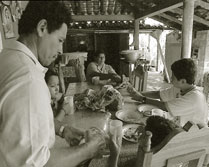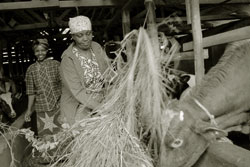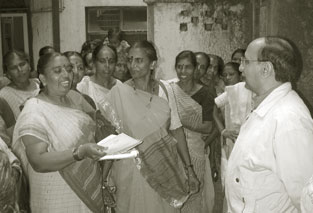

the Niger
Creating a culture for innovation
Every organization has innovators: the key is creating an atmosphere where innovation can thrive
Anita Kelles-Viitanen joined IFAD in February 2005 as policy coordinator for the Initiative for Mainstreaming Innovation (IMI), a three-year programme established in 2004 to enhance IFAD’s capacity to promote innovations that reduce rural poverty. She shares her thoughts on what it takes to create a culture conducive to innovation. more
From the President
IFAD commemorates the International Year of Deserts and Desertification 2006 by increasing awareness of the links between land degradation and poverty
![]() Poverty and desertification are closely linked. Poverty pushes people onto fragile lands, where they must often take desperate measures to survive. The resulting deforestation, overgrazing and poor irrigation can lead to land degradation. Stripped of its fertility, degraded land no longer supports people and communities, thus feeding the vicious cycle of poverty. Today, more than 100 million people worldwide risk forced migration due to desertification and land degradation. more
Poverty and desertification are closely linked. Poverty pushes people onto fragile lands, where they must often take desperate measures to survive. The resulting deforestation, overgrazing and poor irrigation can lead to land degradation. Stripped of its fertility, degraded land no longer supports people and communities, thus feeding the vicious cycle of poverty. Today, more than 100 million people worldwide risk forced migration due to desertification and land degradation. more
Remittances: spreading the benefits
 A new IFAD documentary examines why banks, governments and development agencies are interested in the flow of remittances
A new IFAD documentary examines why banks, governments and development agencies are interested in the flow of remittances
For generations, economic migrants around the world have left home seeking better wages. Today the money they send home totals an estimated US$200 billion a year. In Latin America, remittances are worth more than foreign direct investment, official development assistance and foreign aid combined. What is the potential for remittances to reduce rural poverty? more
Teaming up on agrarian reform
From Bolivia to Zambia, IFAD and the International Land Coalition are making progress in improving access to land
 The International Land Coalition ended its Global Assembly in Santa Cruz, Bolivia, in March 2005 with a declaration on collective action for agrarian reform. The declaration is an important indicator of progress towards achievement of the strategic objectives set at the previous assembly in Rome in 2003. The declaration signals the growing solidarity and joint efforts of all members of the Land Coalition. more
The International Land Coalition ended its Global Assembly in Santa Cruz, Bolivia, in March 2005 with a declaration on collective action for agrarian reform. The declaration is an important indicator of progress towards achievement of the strategic objectives set at the previous assembly in Rome in 2003. The declaration signals the growing solidarity and joint efforts of all members of the Land Coalition. more
Helping tsunami survivors help themselves
Rebuilding stronger livelihoods in vulnerable communities starts with listening to the aspirations of rural poor people
![]() One month after the December 2004 tsunami claimed the lives of hundreds of thousands of people, IFAD organized an inception mission with the Government of Indonesia to Aceh, the worst-hit province. Survivors spoke of how much they had lost, but also expressed hope for the future. more
One month after the December 2004 tsunami claimed the lives of hundreds of thousands of people, IFAD organized an inception mission with the Government of Indonesia to Aceh, the worst-hit province. Survivors spoke of how much they had lost, but also expressed hope for the future. more
Innovation regenerates forests in the Niger
Local knowledge and a new type of relationship between farmers, extension workers and researchers are yielding impressive results
![]() In the Maradi region of southern Niger, farmers are exploring innovative ways of managing natural resources. Farmers are demonstrating these innovations to extension workers and university researchers, and together they are looking for ways to improve and replicate them. more
In the Maradi region of southern Niger, farmers are exploring innovative ways of managing natural resources. Farmers are demonstrating these innovations to extension workers and university researchers, and together they are looking for ways to improve and replicate them. more
Bringing markets closer in the United Republic of Tanzania
The IFAD-supported First Mile project is using the power of communication to link farmers with markets
 Good communication is vital to small farmers who need better access to markets and to reliable information about prices, product quality and market conditions. Can new information and communication technologies (ICTs), especially the Internet, help? The First Mile is a two-year pilot project in United Republic of Tanzania. It is supported by a grant from the Government of Switzerland and it is implemented in collaboration with the IFAD-financed Agricultural Marketing Systems Development Programme. Technical assistance is being provided by the International Support Group, an international non-profit professional association. more
Good communication is vital to small farmers who need better access to markets and to reliable information about prices, product quality and market conditions. Can new information and communication technologies (ICTs), especially the Internet, help? The First Mile is a two-year pilot project in United Republic of Tanzania. It is supported by a grant from the Government of Switzerland and it is implemented in collaboration with the IFAD-financed Agricultural Marketing Systems Development Programme. Technical assistance is being provided by the International Support Group, an international non-profit professional association. more
Learning about sector-wide approaches
There are few SWAps in agriculture and rural development and their impact is unclear. So why should IFAD be involved?
![]()
Experiencing poverty up close
Living with poor families in India gives IFAD Executive Board directors new insights into poverty
 Seeing the reality of poverty through the eyes of poor women and their families was the aim of a field visit to Gujurat, India, for four Executive Board directors and a country representative. The visitors joined the women in salt mines, buffalo stables and village assemblies as part of a five-day immersion programme. more
Seeing the reality of poverty through the eyes of poor women and their families was the aim of a field visit to Gujurat, India, for four Executive Board directors and a country representative. The visitors joined the women in salt mines, buffalo stables and village assemblies as part of a five-day immersion programme. more
Finding new ways to access markets
IFAD is working with partners to develop and test innovative ways of linking small-scale producers to markets
![]() Poor access to markets is a major obstacle to reducing poverty in rural areas of developing countries, where inadequate infrastructure, high transport costs, limited market information, and the use of subsidies by wealthy nations impede the ability of farmers to compete in local, national and international markets. more
Poor access to markets is a major obstacle to reducing poverty in rural areas of developing countries, where inadequate infrastructure, high transport costs, limited market information, and the use of subsidies by wealthy nations impede the ability of farmers to compete in local, national and international markets. more
Engaging the private sector
IFAD’s new strategy promotes private-sector development and partnerships to help in the fight against rural poverty
When IFAD started operations more than two decades ago, the public sector was the primary source of new jobs and investment. In most poor countries today, the private sector fills that role. IFAD’s new private-sector development and partnership strategy, approved by the Executive Board last April, promotes private-sector development in rural areas, including by engaging the private sector in IFAD projects. It also examines how IFAD can forge partnerships with the private sector to benefit rural poor people. more
Cocoa farmers find a market
 A French chocolate maker is buying as much organic cocoa as farmers can produce in Sao Tome and Principe
A French chocolate maker is buying as much organic cocoa as farmers can produce in Sao Tome and Principe
Cocoa sales represent 90 per cent of Sao Tome and Principe’s export earnings, but extreme price volatility has caused many producers to abandon their farms. more